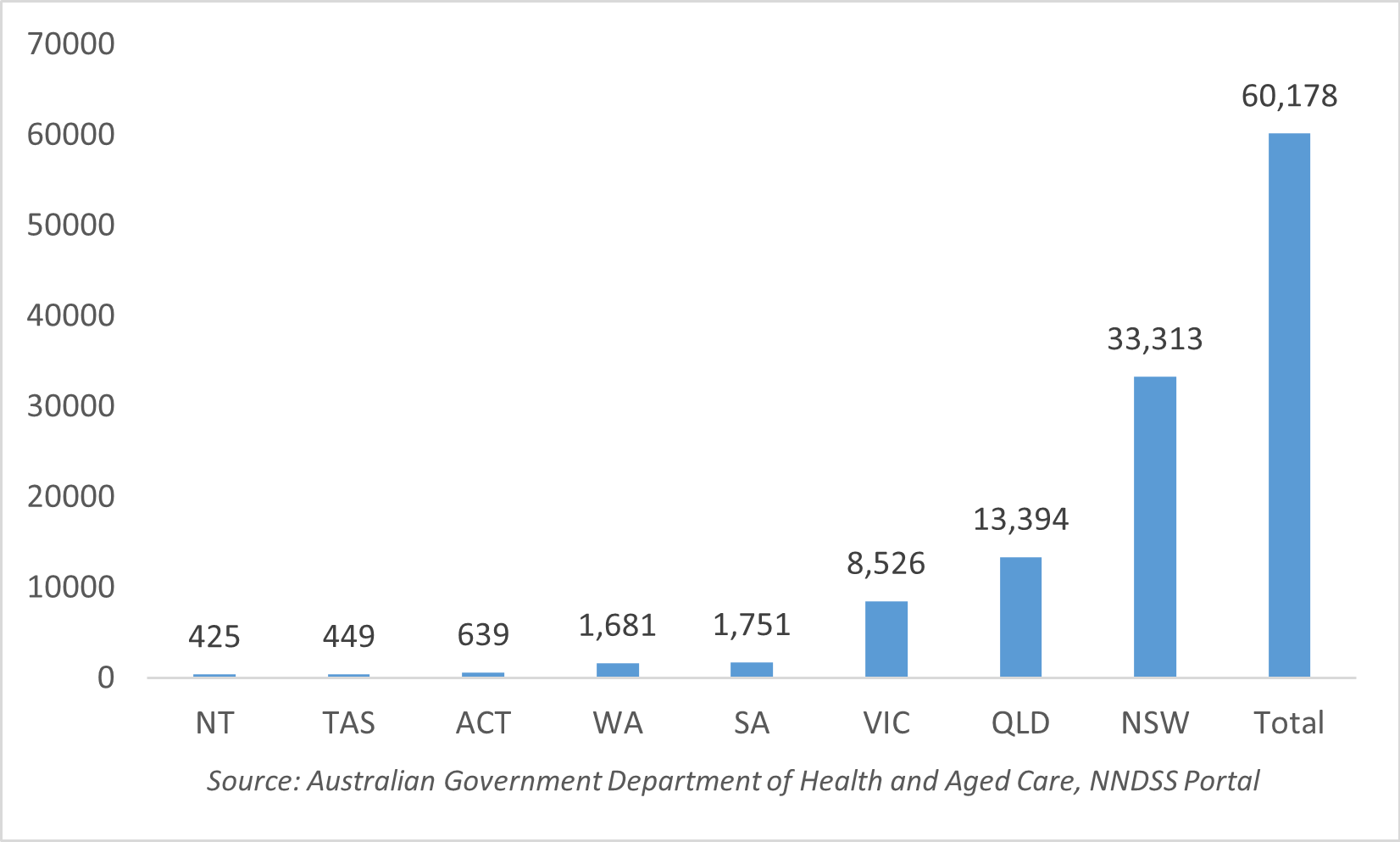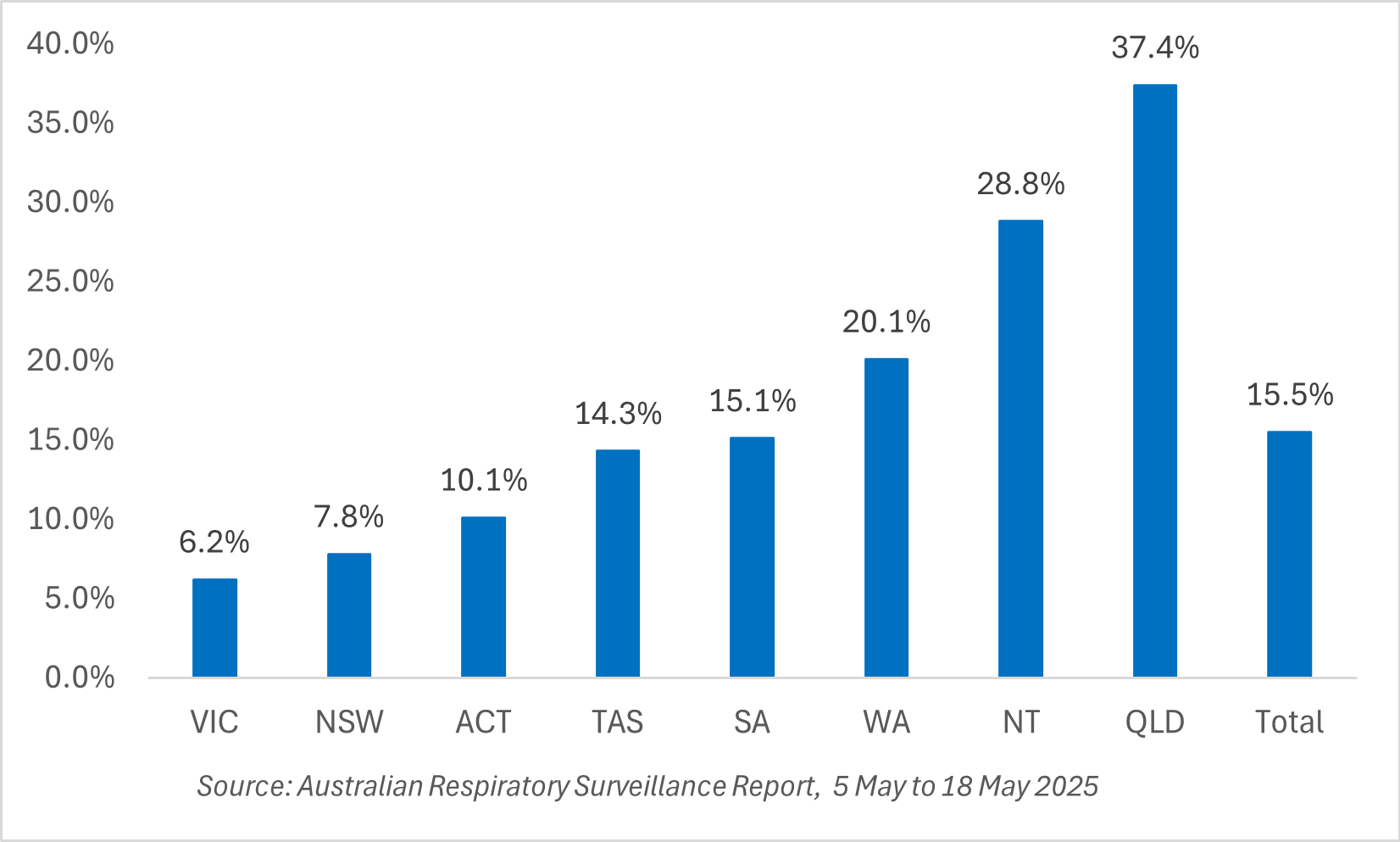50% drop in babies admitted to hospital with RSV
Immunisation Foundation of Australia

Experts say new immunisation program working,
but some babies missing out
The number of Australian babies admitted to hospital with RSV (respiratory syncytial virus) has nearly halved compared to the same time last year, following the nationwide rollout of free maternal and infant RSV immunisations.1
In April 2025, just 84 babies under six months of age were admitted to major Australian hospitals with severe RSV compared to 165 in April 2024.1 Intensive care admissions also fell, with just 7.1 per cent of cases requiring ICU support, compared to 11.5 per cent last year.1
Infectious disease experts are welcoming this new data, the first hospitalisation data since the introduction of the National RSV Mother and Infant Protection Program earlier this year, as a positive sign that the program is working, but warn that winter will be most telling.
In Western Australia, the only state where comprehensive RSV immunisation uptake data is already available, more than 10,000 babies have been protected against the unpredictable respiratory virus in 2025.2
Based on this data, the Immunisation Foundation of Australia (IFA) estimates that as many as 90,000 babies across Australia – around a third of all babies expected to be born in 2025 – may have already received RSV protection in the first months of the immunisation program.2,3
Australia’s world-leading program offers Australian parents the choice between free maternal RSV vaccination (administered between 28-36 weeks of pregnancy) or free infant RSV immunisation given to the baby at birth or ahead of or during winter, depending on when they are born.
However, new data shows that uptake of the infant RSV immunisation varies significantly across Australia in the lead up to winter. Between 3 February and 18 May 2025, coverage ranged from 37.4% of infants aged under 8 months in Queensland, to just 7.8% in New South Wales and 6.2% in Victoria.4 National data on the uptake of maternal RSV vaccination is not yet available.
More than 60,000 cases of RSV have already been reported nationally, with more than half occurring in children aged under five years.5 Notifications are expected to rise throughout winter, as occurred in 2024 when the total number of RSV cases reported for the year exceeded 175,000.5
“RSV continues to pose a serious risk to young children, and while we're seeing positive signs, broader immunisation uptake remains critical,” said Catherine Hughes AM, Founder of the Immunisation Foundation of Australia.
“We’re hearing that some parents are unsure whether their baby is eligible for free RSV immunisation, or worse, that babies have been hospitalised after missing out on protection and falling through the cracks,” she said.
Without RSV immunisation, around 12,000 Australian babies aged 12 months or younger are admitted to hospital with severe RSV each year.5
The IFA’s analysis follows real-world studies of the efficacy of the infant RSV immunisation in Australia and overseas. Last year in Western Australia, RSV protection was found to be 88.2% effective in preventing infant hospitalisations.6
“We know that RSV immunisations work incredibly well when parents and healthcare professionals act to protect infants,” said Perth Children’s Hospital Paediatrician and Vaccination Specialist, Professor Chris Blyth from Wesfarmers Centre of Vaccine & Infectious Diseases at the Kids Research Institute, Australia.
“With winter now upon us, now is the time to ensure that as many babies and infants as possible are protected against severe RSV,” he said.
“By continuing to ensure babies receive RSV immunisation, we have the potential to prevent thousands of infant hospitalisations across the country this winter.”
The IFA is calling on Australian families to ‘Don’t Let Them Go Unprotected’, as part of its nationwide RSV Awareness Week (1-7 June) campaign to encourage the immunisation of babies against RSV this winter.
Ms Hughes stressed that it’s not too late to protect babies against severe RSV. “It’s only the start of winter and we know that with strong uptake of RSV immunisations we can prevent up to 10,000 hospitalisations each year.”
“If a mother did not receive the maternal RSV vaccine while pregnant and her baby was not immunised against RSV at birth, she should immediately see an immunisation provider about RSV protection,” she said.
Catch-up programs for older infants entering their first RSV season differ by state or territory. A full breakdown is available here.
In addition to calling for greater acceptance of infant RSV immunisation, the IFA is advocating for affordable access to RSV vaccines for older Australians. With RSV posing a significant health risk to older adults,7 the IFA is calling for expanded vaccine availability and increased public awareness to help protect this vulnerable population.
RSV notifications (all ages) by state and territory as at 3 June 20255
Infant immunisation coverage (Beyfortus - nirsevimab) in infants aged <8 months, by state and territory, 3 February to 18 May 20254*
* Infant RSV immunisation only – national data on the uptake of maternal RSV vaccination is not yet available.
About RSV (respiratory syncytial virus) in children
RSV is the number one cause of hospitalisation for Australian children under five years of age, with up to one-in-four of these children requiring intensive care.2 Without RSV immunisation, around 12,000 Australian babies aged 12 months or younger are admitted to hospital with severe RSV each year.2
RSV is a highly contagious virus that most often strikes during the winter months. Babies under the age of six months are most likely to develop severe symptoms, including serious lung infections such as bronchiolitis and pneumonia.2 Further information can be found here.
Parents can protect their infant from severe RSV in two ways:
- Maternal vaccination (Abrysvo) – a vaccine given to a mother during pregnancy so she can develop and pass on protective antibodies to her baby when born. Protection lasts for 5-6 months after birth.
- Infant immunisation (Beyfortus, also known as nirsevimab) – ready-made antibodies that offer same-day protection against severe RSV infection. Protection lasts for 5-6 months after injection. Infant immunisation is available to protect babies entering their first winter who haven’t already received the maternal vaccine. Also eligible are many high-risk babies entering their second winter, including those born before 32 weeks gestation, and those with congenital heart disease, certain immune deficiency disorders, chronic lung disease, cystic fibrosis and Down Syndrome. Specific information can be found here.
For more information on RSV and the Immunisation Foundation of Australia, visit www.ifa.org.au/uniteagainstrsv
References
- Paediatric RSV in Australia, Paeds.org.au. Available from: https://paeds.org.au/respiratory-syncytial-virus-rsv/paediatric-rsv-australia
- Government of Western Australia, Department of Health. Virus Watch, week ending 25h May 2025. Available from: https://www.health.wa.gov.au/Articles/F_I/Infectious-disease-data/Virus-WAtch
- Australian Bureau of Statistics, 2023. Births, Australia. Available at: https://www.abs.gov.au/statistics/people/population/births-australia/latest-release
- Australian Government Department of Health, Disability and Ageing. Australian Respiratory Surveillance Report. 5 May to 18 May 2025. Available here.
- Department of Health and Age Care. National Notifiable Disease Surveillance System. May 2025. Available at https://nindss.health.gov.au/pbi-dashboard/
- Evohealth. Time to Act – Protecting our children from RSV. 2023. Available at: https://www.evohealth.com.au/insights/time-to-act-protecting-our-children-from-rsv/
- Wadia U et al. Effectiveness of nirsevimab in preventing RSV-hospitalisation among young children in Western Australia 2024. Journal of Infection 2025, Apr; 90(4): 106466. doi: 10.1016/j.jinf.2025.106466.
- Australian Government Department of Health and Aged Care. Respiratory syncytial virus (RSV). The Australian Immunisation Handbook. 2024. Available here.
Key Facts:
- RSV hospitalisations in babies aged under six months halved. ICU admissions also significantly down.
- Infant RSV immunisation uptake rates vary – 37% in QLD, but just 8% in NSW and 6% in VIC.
- More than 60,000 RSV cases reported so far this year – most in children under five, with numbers of the seasonal virus rising significantly as winter hits.
About us:
About the Immunisation Foundation of Australia
The Immunisation Foundation of Australia was established by the family of Riley Hughes, who have become vocal advocates of immunisation after the death of their son from whooping cough in 2015. Believing in the importance of parents and community-members standing up to support immunisation, the foundation’s mission is to inspire further community-based immunisation advocacy, helping to protect babies and families from vaccine-preventable diseases.
In 2023, the Immunisation Foundation of Australia ran Australia’s first ever RSV Awareness Week, which encouraged families impacted by RSV to share their stories. The campaign was supported by Karl and Jasmine Stefanovic.
The Immunisation Foundation of Australia envisions a world where families are no longer affected by the unnecessary suffering and death caused by vaccine-preventable diseases. To help make this vision a reality, we are committed to creating a network of community-based immunisation champions, who share our common values of respect, integrity and evidence-based advocacy.
Catherine Hughes, Founder and Director of the Immunisation Foundation of Australia
Catherine is the founder of the Immunisation Foundation of Australia and Light For Riley, established after the death of her son Riley from whooping cough in 2015.
Only days after Riley's death, Catherine and husband Greg successfully advocated for the introduction of free whooping cough vaccines for pregnant women, resulting in a sharp increase in awareness of the impact of whooping cough on babies and up to 90 per cent of Australian pregnant women choosing to protect their babies during pregnancy.
In 2016, Catherine’s infant daughter Lucy was hospitalised with severe RSV. She says: “I won’t lie. We were consumed by thoughts of Riley and a foreboding sense of ‘not again’.” Catherine’s story can be accessed here. In 2022, Catherine was appointed a Member of the Order of Australia for her services to immunisation.
Contact details:
To arrange an interview with a medical expert or family impacted by RSV, please contact:
Catherine Hughes on 0421 483 391
Candice Hitchcock on 0466 586 758





